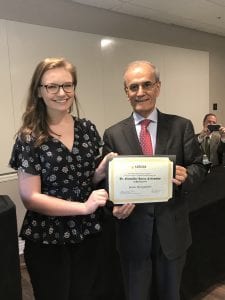Panel Discusses Past and Future of Kurdish Society

On Nov. 15, 2018, the Kurdish Political Studies Program (KPSP) at the University of Central Florida (UCF) invited experts on Kurdish society and politics to a panel to discuss the way forward in the region, and specifically among the Kurds. The event drew attention from a mixed audience, ranging from UCF undergraduate and graduate students to residents of the area interested in Kurdish issues to KPSP Advisory Board members.
While the terrorist group Islamic State (ISIS) seems to be weakened in the Middle East, issues surrounding Kurdish society and Kurdish militant and political organizations concerned with ISIS remain contentious. The panel began by honoring Jenna Dovydaitis with the Dr. Najmaldin Karim Fellowship in Kurdish Political Studies – presented by Karim himself. Dovydaitis is a high-achieving undergraduate student at UCF majoring in biology and political science, with a research interest in biosecurity and the prevention of chemical warfare. As a fellow for the Spring 2019 semester, Dovydaitis will work under KPSP faculty supervision on a research project related to a Kurdish issue.
The award ceremony was followed by presentations from the invited guest speakers. Aliza Marcus, author of Blood and Belief: the PKK and the Kurdish Fight for Independence, introduced the audience to the actions of the Kurdistan Regional Government (KRG) and Kurdistan Workers Party (PKK). Marcus discussed the background leading up to the Iraqi Kurdish independence referendum 2017, and how the US indirectly advised the KRG that it was not a wise decision at that point in time.
This was disputed by another panelist, Bayar Mustafa Sevdeen, Ph.D., assistant professor at the College of International Studies at the American University of Kurdistan. While Marcus argued that Masoud Barzani’s decision to hold the referendum was not the best political strategy (as the KRG had to pay the price), Mustafa criticized the U.S. for not giving a tangible plan for a later referendum since the Iraqi government had been hostile towards the KRG and had plans to limit its autonomy further.
Tyler Fisher, Ph.D., associate professor in UCF’s Department of Modern Languages and Literatures, reported on the Yazidis’ experiences in the face of genocidal attacks by ISIS and the societal transformation after the last genocide. The Yazidis, a religious minority of ethnic Kurds, used their beliefs in ancient spiritual practices (shamanism) to become resilient toward ISIS’ attacks. Fisher explained that the rise of ISIS may on the one hand have led to a detachment from religion among Yazidis, but on the other led to increased wisdom about religious traditions. The audience followed up with questions about the role of Kurdish politics in Iraq, Turkey and Syria and the role the US may have in the fate of the Kurds.
The KPSP thanks UCF Global Perspectives Office, the UCF Department of Political Science, the Prince Mohammad Bin Fahd Program, and moderator Haidar Khezri, Ph.D., for their support in organizing the panel, as well as the KPSP Annual Dinner on Nov. 14, 2018. More information about the KPSP can be found here.
